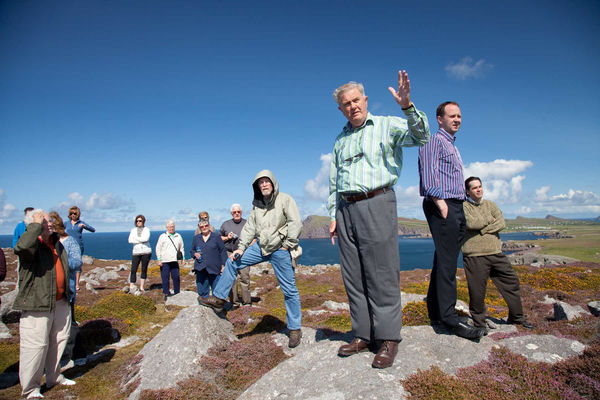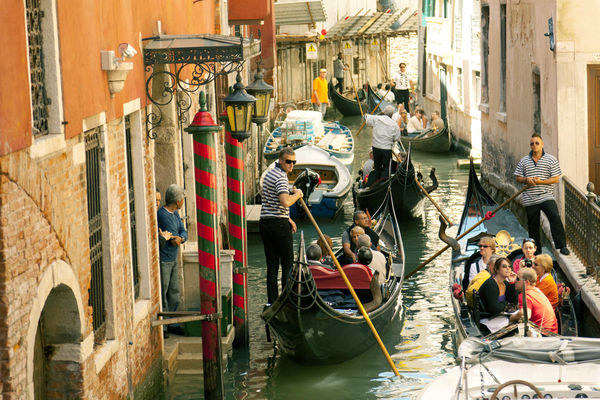Bus Tour Self-Defense: Tips for Enjoying Europe on a Big-Bus Tour


By Rick Steves
For many people, a bus tour in Europe is the best way to scratch their travel itch. Having someone else navigate for you, arrange transportation and hotels, and make the decisions takes the stress and work out of travel.
A tour can also be the most economical way to see Europe: Large tour companies book thousands of rooms and meals year-round, and with their tremendous economic clout, they can get prices that no individual tourist can match.
If you're looking to travel comfortably and cheaply, bus tours can be a good option — and if you've got an excellent guide, it can be a great one. The best guides bring Roman life alive in Pompeii or help you recall recent history in Berlin.
Once you're on board with a bus tour, you'll be part of a group dynamic, but that doesn't mean you can't have control over your trip. Here are some suggestions to help make sure the good times roll for you while you're on the road:
Be informed. A good guidebook and map are your keys to travel freedom. Get maps and tourist information from your hotel or a tourist information office. If your accommodations are located outside the city center, ask your hotelier how to take public transportation downtown. Taxis and Uber can be affordable if you split the cost with other travelers.
Remember that it's your trip. Don't let bus tour priorities keep you from what you've traveled all the way to Europe to see. If your Amsterdam guide schedules a trip to the diamond-polishing place instead of the Van Gogh Museum (no kickbacks on Van Gogh), feel free to skip out and sightsee on your own. Your guide may warn you that you'll get lost and the bus won't wait. Keep your independence — and remember the name of your hotel.
If you're taking a bus tour with a group of friends or another couple, don't be afraid to strike out on your own every once in a while. Everyone has their own sightseeing preferences, and spending time going at your own pace will make your trip (and friendship) more enjoyable. Plus, you'll have much more to talk about when you reunite for dinner.
Discriminate among optional excursions. Some tour companies include certain activities in the price (such as half-day city sightseeing tours), then offer optional special excursions or evening activities for an additional cost. While you are capable of doing plenty on your own, optional excursions can be a decent value — especially when you factor in the time and energy it requires to plan and execute logistics independently. But don't feel pressured to join. Guides may promote excursions because they get a commission. Compare prices by asking your hotelier or checking online for the going rate for a gondola ride, Seine River cruise, fado show, or whatever.
You'll find that some options are a better value through your tour than from the hotel concierge, but others aren't worth the time or money. While illuminated night tours of Rome and Paris are marvelous, I'd skip most "nights on the town." On the worst kind of big-bus-tour evening, several bus tours come together for an evening of "local color." Three hundred tourists drinking watered-down sangria and watching flamenco dancing on stage to the rhythm of their camera clicks is big-bus tourism at its worst.
If you shop…shop around. Many people make their European holiday one long shopping spree. This suits your guide and the local tourism industry just fine. Guides are quick to say, "If you haven't bought a Rolex, you haven't really been to Switzerland," or, "You can't say you've experienced Florence if you haven't bargained for and bought a leather coat."
Don't necessarily reject your guide's shopping tips; just keep in mind that the prices you see often include a 10 to 20 percent kickback. Do some comparison shopping, and don't let anyone rush you. Never swallow the line, "This is a special price available only to your tour, but you must buy now."
Keep your guide happy. Leading a tour is a demanding job with lots of responsibility, paperwork, traveler hand-holding, and miserable hours. Very often, guides are tired. They're away from home and family — often for months on end — and are surrounded by foreigners having an extended party that they're not always in the mood to join. Most guides treasure their time alone. Each traveler has personal demands, but don't insist on individual attention when the guide is being hounded by others. Wait for a quiet moment to ask for advice or offer feedback.
Some guides feel threatened by independent-type tourists, but it's possible to maintain your independence without alienating your guide. Use your guide as a resource, and consider their insider advice when planning your solo sightseeing.
Seek out unjaded locals. The locals most tour groups encounter are hardened businesspeople who put up with tourists because they have to — it's their livelihood. Spending a "Bavarian evening" with 40 Americans at a touristy beer hall in Munich, you'll meet all the wrong Germans. But if you make it a quest to find your own beer hall, it won't be long before you're clinking mugs with friendly locals. Break away. One summer night in Regensburg, Germany, I skipped out. While my tour was still piling off the bus, I enjoyed a beer — while overlooking the Danube, and under shooting stars — with the great-great-great-grandson of the astronomer Johannes Kepler.

